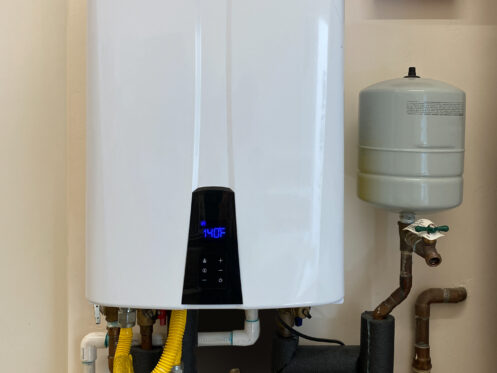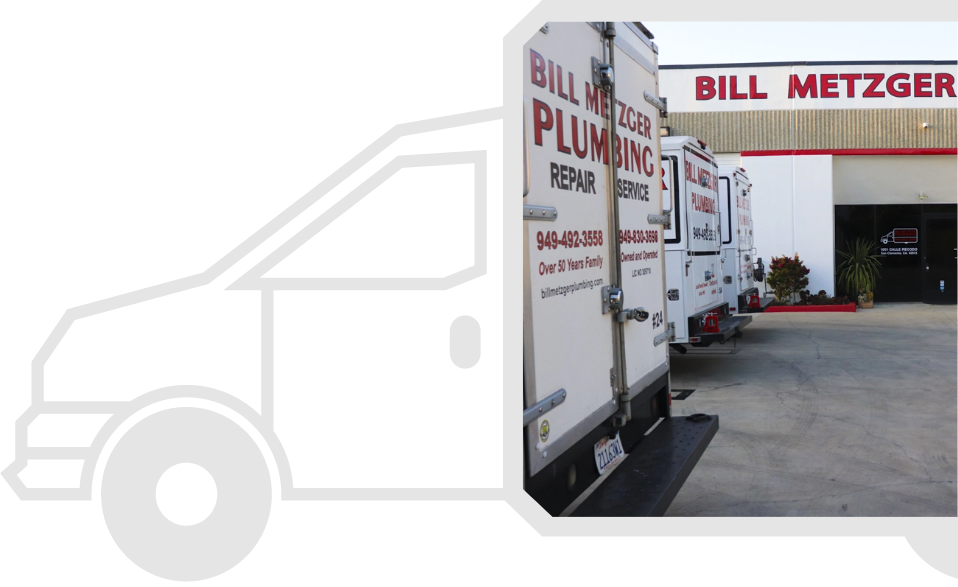As we enter into the cold winter season where the days get shorter, many homeowners are finding themselves spending more time at home. If you’re like most, you’ll start to wonder about the efficiency of your home and how to continue to cut energy costs throughout the year. One appliance that you may find yourself concerned with is your water heater.
Understanding How a Water Heater Works
Before we dive into how cold weather affects a water heater’s performance, it’s important to first start by understanding how a water heater operates. With most homeowners having a tanked water heater, we’re going to focus on describing the operation of this type of unit.
A tanked water heater has a large cylindrical storage tank that’s responsible for holding water. As water enters the tank, it will be preheated to whatever temperature you have set on your thermostat. Many tanked water heaters will have two heating elements, one at the bottom and one at the top of the tank for uniform heating.
This style of water heater will provide continual heat to the water in its tank to ensure that it adequately maintains your desired temperature. When you use your hot water, such as when taking a hot shower, hot water will exit your water heater. New, cold water will be introduced into your water heater to return the tank to its full capacity.
More Dissipating Heat Loss
One of the first ways that cold weather can affect your water heater is through dissipating heat loss. Most water heaters are put in unheated areas of the home, such as in the basement. As cold weather surrounds the water heater, the heat from the water inside the tank will start to dissipate into the colder air. This will leave your water heater working overtime to get the water in its tank to remain at your desired temperature setting.
Colder Water Inlet Temperature
The fresh water coming into your water heater is going to have a big impact on how much your water heater has to work. When there’s a large temperature difference, your water heater is going to have to run longer to heat the water in its tank to your ideal temperature. Unfortunately, when the weather outside is cold, it can cause the temperature of the water coming into your water heater to drop.
Temperature Drop While Traveling
When the preheated water for your water heater exits the hot water tank to be delivered to the various plumbing fixtures in your home, it will drop in temperature. It will seem like no matter how high you have the heat level set on your faucet, it just won’t get up to temperature. This causes most homeowners to increase the setting on their water heater’s thermostat to compensate for the traveling heat loss.
Rising Hot Water Demand
During the wintertime, it’s very common for people to spend more time at home. This leads to more hot water usage than during the hot summer months. This rising demand puts an added strain on your water heater as it will be required to heat up cold water more often than usual.
Tips on Preventing Wintertime Hot Water Heater Strain
As the cold weather settles in, you don’t have to just put up with the excess strain on your water heater and higher energy bills. Rather, there are various things you can do to enhance the operating efficiency of your water heater while extending its overall longevity.
Use an Insulating Jacket
One of the best investments to minimize dissipating heat loss is with an insulating jacket. This is a heat-insulating blanket that zips or buttons up around your water heater. This jacket helps to keep more of the heat inside your water heater’s tank, so your water heater can run less often.
Insulate Your Piping
Just as insulation works well to retain heat in your water heater’s storage tank, it’s also effective at allowing heat to remain in your hot water supply piping. A simple sleeve insulation that slides over the piping is relatively affordable and easy to install. Opt for insulating all parts of your hot water supply lines that are visible.
Consider a Water Softener
When your home relies on hard water, it can have a tremendous effect on your water heater. The excess magnesium and calcium minerals can make it more challenging to heat up. This will cause your water heater to run excessively to get your water up to your desired temperature.
A water softener can be a worthy investment that will remove these excess mineral sediments from your water supply before it enters your water heater. This will go a long way in enhancing the efficiency of your hot water heater throughout the year, especially during the wintertime when your water heater is excessively strained.
Get Routine Maintenance Service
Over time, excess sediments can build up inside your water heater’s tank and make it much less efficient. Having a professional plumber service your unit before the winter months can go a long way in enhancing its overall operating efficiency.
A good service will include tasks like flushing your water heater, testing its pressure relief valve, and so forth. This will also help to identify any potential problems that could be causing your water heater to operate inefficiently. This way, you can get them repaired before the winter season hits.
Use Low-Flow Fixtures
Controlling the amount of hot water you use during the winter can have a big impact on relieving the excess strain on your water heater. A great way to reduce hot water use is by installing low-flow plumbing fixtures. You can use aerators for your sinks and low-flow showerheads for your tubs. This will use significantly less hot water while still providing a comfortable amount of water for your daily washing tasks.
Upgrade Your Water Heater
If your existing water heater is over eight years old, it’s time to consider an upgrade. Newer tanked water heaters are more efficient now than just a decade ago. Furthermore, you have the option of upgrading to a tankless water heater. Tankless water heaters don’t have a storage tank. Rather, they simply heat the temperature of your fresh water as it flows through the water heater.
Water only flows through the water heater when there is a demand placed on your hot water line, such as turning on the hot side of your faucet or your dishwasher needing hot water to run. Due to the way that a tankless water heater operates, it’s much more energy efficient than traditional tanked water heaters.
Additionally, tankless water heaters don’t have to worry about heat loss through dissipation since they don’t have a tank. By stacking their increased efficiency, you can help lower your energy bills and reduce the strain that winter brings on your water heater.
Expert Water Heater Service
Bill Metzger Plumbing offers expert water heater service to the San Clemente, CA area. We can also assist with all your plumbing, drain, and sewer needs. Call our office today to schedule a consultation with one of our plumbing professionals.



 Today
Today 